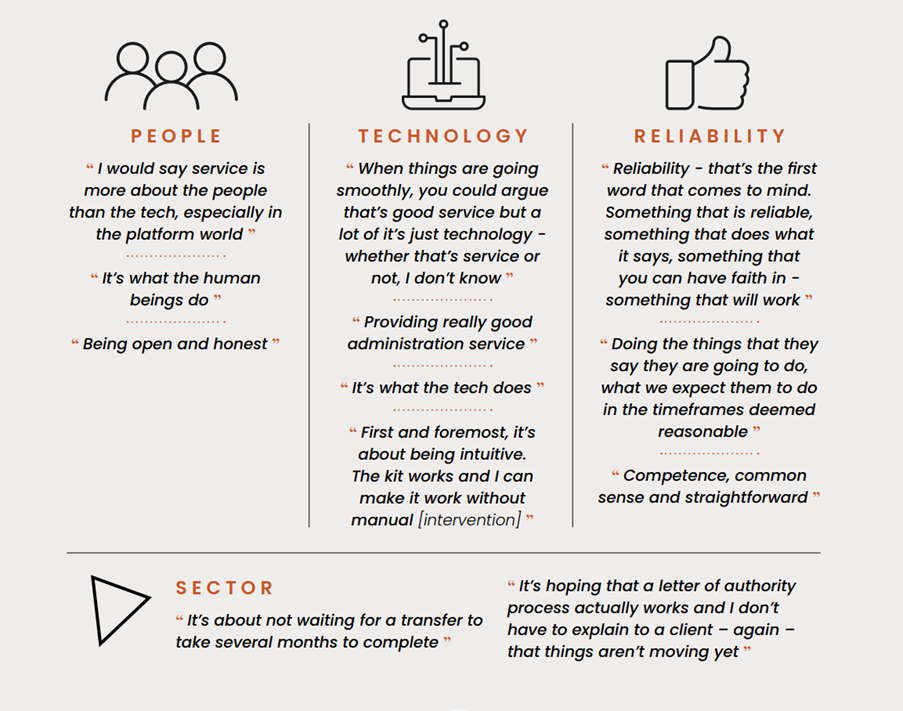We’ve decided to make service a key focus here at the lang cat.
It’s important to us for a few reasons.
Steve and fellow lang cat Rich Mayor, who co-wrote our latest report, Answering the Call – Time to look differently at platform service, have both worked in service roles in the past. They understand the real-world implications for advisers and clients when platform service goes wrong, and equally when providers go above and beyond.
The paper, sponsored by abrdn, examines what we really mean by service and why it is so hard to define. It’s also us kick-starting an ongoing discussion on what better service could actually look like, and more importantly, how we get there.
Alongside the report, we’ve heard three distinct perspectives:
- Steve Nelson, insight director, the lang cat
- Siân Davies Cole, chartered paraplanner and director, Plan Works
- Jonny Black, chief commercial and strategy officer, abrdn
In the first of a three-part mini-series, Steve talks us through some of the main themes from the report. Our findings are based on a mix of in-depth adviser interviews, adviser research through the lang cat’s adviser panel, and the latest wave of State of the Adviser (SOTAN).
Why service and why now
In the latest wave of SOTAN, we had a section with five or six questions on platforms and providers.
When we looked at the responses, the number one determining factor of satisfaction is service. It’s also the number one issue that causes dissatisfaction, and the number one thing advice professionals would invest in if they had the choice. It’s also the one thing you prefer most about your primary platform. Service just keeps coming through.
We started to think that this notion of the word service has become too amorphous, a catch-all for what is such a huge, important issue. And we think it merits further exploration to try and get under the bonnet a bit and try and figure out what service actually means.
The main findings
From our interviews, when we asked people what service meant to them there were four fundamental themes that came through:
For us, this paper is an attempt to try and change the conversation around this single word of ‘service’. Not only because it’s quite inelegant, but it’s also severely inefficient for making good decisions.
The issue with awards and ratings
As part of our conversations with advisers, we asked them to what extent they agreed with the following statement:
“We believe it is currently extraordinarily difficult to assess the quality of servicing across the financial services sector without taking the plunge and actually experiencing it. By then it could be too late. You as a profession have to rely on peer review as opposed to reliable, robust data. Fundamentally, this part of the market is broken and needs addressed.”
That was met with lots of clear agreement. We then presented a slightly softer series of more neutral statements in the quantitative research, to counter what was in retrospect too leading a question. Huge agreement came through again, and over 70% of respondents felt they couldn’t make an informed judgement on service based on awards and ratings.
What I don’t want this paper to be seen as is a hatchet job on awards and ratings. The sector is full of people trying to do the right thing, trying to make the right assessments based on the information at hand. It’s really difficult to do, and to do it well.
There’s a huge collective spend on ratings, awards, assessments, disclosing information, due diligence packs, all the stuff in the round that’s meant to fundamentally help the advice profession feel more informed and make the right judgements on behalf of your clients.
That’s all funded by client money. And yet, despite all this time and money being spent, it’s not working. People can’t make those informed decisions.
As a result, it’s incumbent on us to look at this differently. I don’t have the answer right now, but what’s clear is we have a mandate from the profession to explore this issue and do it better.
Steve Nelson is insight director at the lang cat
This is an excerpt from our recent webinar on what service really means. Watch back the full discussion here.
—
Answering the Call is the first in a series of projects we’re carrying out at the lang cat this year to really understand service, and to work up a framework for how to assess and measure it better.
Watch this space for our next adviser survey, landing in your inbox shortly, which will look to progress these initial findings. If you’ve got views on how we can help you measure service more effectively, we’d love to hear them.






